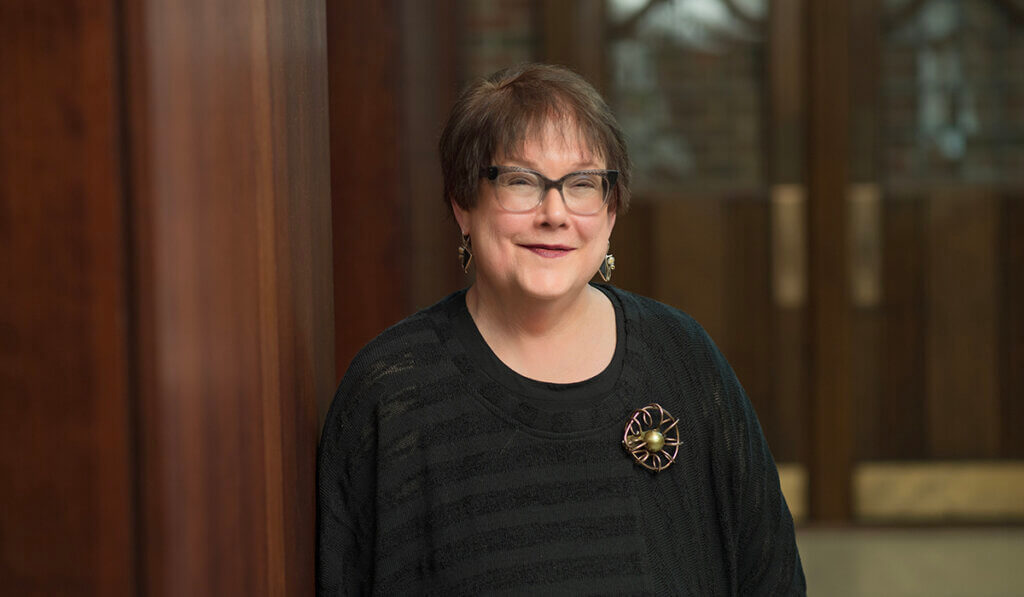Purdue Alumna and Animal Lover Joanne Troutner Invests in PVM Diversity Initiatives to Honor Dean Willie Reed

In another life, Joanne Troutner might have been a veterinarian. But in the early 1970s — when the national average of male enrollment in veterinary schools was 89% — a career in veterinary medicine didn’t seem accessible to her. Now, women in the profession outnumber men, and yet diversity remains an issue, as 90% of today’s veterinarians identify as white.
In 2008, the Purdue University College of Veterinary Medicine established the Office of Diversity, Equity, and Inclusion with the purpose of intentionally creating a culture of excellence that supports a diverse and inclusive environment in the college. The creation of the new office reflected the vision of Dr. Willie Reed, who had just been appointed as the college’s new dean a year earlier.
“The College of Veterinary Medicine has been engaged in this work for 15 years,” Joanne said. “The programming is phenomenal and it’s having a real impact. It’s necessary work and it needs to continue, which is why I’m proud to support the college’s DEI efforts with a designated gift, given in honor of Dean Reed.”
A Farm Girl at Heart
A self-described farm girl who grew up near the one-stoplight town of Gaston in Western Indiana, Joanne participated in 4-H, showing cattle and hogs at the Delaware County Fair.
“I once got kicked trying to pet one of the milk cows,” Joanne said. “I’ve always loved animals, but I also learned to respect them at a young age. Farm life taught me to be a hard worker and that there was no job too awful to do because every job needed to be done.”
Joanne bonded with her animals. Not only the pets — she believes dogs were meant to be black, female, and named Susie — but the livestock, too. At age 13, her steer named Sammy won grand champion at the county fair. Her family sold Sammy to a supermarket chain at the conclusion of the fair, but Joanne asked if she could borrow Sammy for a few weeks to take the steer on the show circuit. The representatives from the grocery firm agreed, but Sammy had already been moved to the stockyards where he was mixed in with dozens of similar looking cattle.
“I walked past these grizzled older men who worked at the stockyards,” Joanne said. “And they asked me, ‘Little girl, how do you think you’re going to find your calf?’ I stepped up to the pen and started calling Sammy’s name. Pretty soon, through all the other cattle, here comes Sammy. Those stockyard workers were stunned silent. They’d never seen a steer that was trained to come to its name.”
Growing up, Joanne only knew of male veterinarians. In the 1960s, the profession was 98% male. In 1970, when Joanne enrolled as an undergraduate at Purdue, pursuing a degree in veterinary medicine never even crossed her mind.
“Career choices for women were somewhat limited in the early 1970s,” Joanne said. “I could be a nurse or a teacher. My mother was an English major and a business major, so that influenced my decision to become an educator.”
Joanne majored in English and media sciences at Purdue and earned her bachelor’s in 1974. She was part of the last freshman class forced to wear the green beanies — a tradition said to have started in the early 1900s as a means by which upper classmen could assure themselves that students in incoming classes, considered as “green” fledglings, wouldn’t be mistaken for juniors or seniors. Joanne served as a student leader in Green Guard, an organization that helped incoming freshmen women acclimate to campus life. She was also a member of Angel Flight, the Air Force ROTC women’s auxiliary (now a co-ed organization named Silver Wings), which is how she met her husband, Lary Troutner, a 1976 history grad and member of Air Force ROTC.
In 1976, she earned a master’s in audio-visual technology from Purdue. Early in her career, she was a high school library media specialist at Lafayette Jefferson High School. She later worked for the Tippecanoe School Corporation and retired from the TSC as director of media and technology.
Loyal Boilermakers
Joanne can’t imagine life without Purdue. She and Lary remained connected to the university throughout their marriage. Lary died in 2011 from ALS and Joanne credits her Purdue family with helping her through the transition.
During a dinner at Westwood Manor, Lafayette philanthropist Linda Rohrman suggested Joanne become a Purduette mentor. Rohrman co-founded the Purduette mentoring program in 2005. Joanne is also an honorary advisor for the Purdue Foundation Student Board.
“I love mentoring Purdue students,” Joanne said. “I had the privilege of working with student leaders on the Canine Educators care team in the College of Veterinary Medicine last summer. When I’m working with students, my fondest hope is that I can provide them some insight and wisdom that I wish somebody had given me at their age.”
In addition to her investment of time, Joanne has given generously to support several areas across campus in addition to the College of Veterinary Medicine such as the library system, the Purdue Women’s Network, the establishment of the Joanne J. Troutner Innovative Educators Program and several student scholarships — including one in the College of Agriculture named for her parents and another in the History Department named for Lary.
“I’d give Lary a chunk of the credit for my support of the College of Veterinary Medicine’s DEI initiatives, too,” Joanne said. “As a child, he experienced the integration of his school in Charleston, South Carolina, so he was always sensitive to the need for inclusion.”
Assata Gilmore, the first Black woman to serve as student body president at Purdue (2020-21), also influenced Joanne. Gilmore was president during the summer of 2020 when protests erupted across the nation in the aftermath of George Floyd’s murder by a Minneapolis police officer.
“Assata was a wonderful mentor to me,” Joanne said. “I grew up during the Civil Rights era and saw the police dogs and the fire hoses. As a society, we are still living with ingrained racism and students like Assata challenge us all to do better. Donating to fund DEI initiatives is one way I can answer that challenge.”
“Diversity and inclusiveness doesn’t just happen,” Joanne said. “We need to consciously focus on inclusive excellence. As a librarian and an educator, I was taught to think broadly. It’s imperative that we consider other points of view, not just our own.”
During a President’s Council trip to Monterey, California, in August, Joanne met another Purdue graduate dedicated to diversifying the field of veterinary medicine. Dr. Mike Murray (PU DVM ’77) is the director of veterinary services at the Monterey Bay Aquarium. During his presentation to the President’s Council members, Dr. Murray shared how he began a mentoring program for underrepresented high school students with an interest in veterinary medicine.
“Dr. Mike’s mentoring program was born from a conversation with Dean Willie Reed,” Joanne said. “I’ve always admired Dean Reed’s wisdom and his community involvement. The College of Veterinary Medicine has transformed under his vision. There are a whole lot of things that wouldn’t be in place right now at Purdue if it weren’t for Dean Reed.”
As for Purdue Veterinary Medicine’s Office of Diversity, Equity and Inclusion, Joanne hopes her gift in Dean Reed’s name will provide support for inclusive excellence well into the future. Named the Dean Willie Reed Legacy Endowment for Diversity, Equity, and Inclusion in the College of Veterinary Medicine, the new fund will provide flexibility to support areas of strategic importance that are intended to assist in the advancement of diversity, equity, and inclusion within the college. Suggested uses include, but are not limited to, supporting education programs, activities and/or initiatives related to diversity equity and inclusion missions within the college.
The concept of inclusive excellence recognizes that a community’s success is dependent on how well it values, engages and includes the rich diversity of students, staff, faculty, administrators and alumni. That extends to recruiting, admissions, hiring and promotion processes, curriculum development and administrative structures and practices. “Diversity and inclusiveness doesn’t just happen,” Joanne said. “We need to consciously focus on inclusive excellence. As a librarian and an educator, I was taught to think broadly. It’s imperative that we consider other points of view, not just our own.” Through the new Dean Willie Reed Legacy Endowment for Diversity, Equity, and Inclusion in the College of Veterinary Medicine, Joanne’s passion for inclusive excellence will be permanently linked with Dean Reed’s legacy of tangibly expanding diversity, equity and inclusion in the veterinary medical profession.

